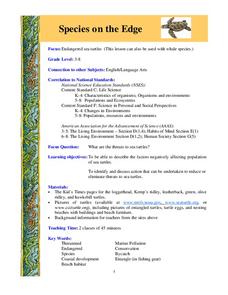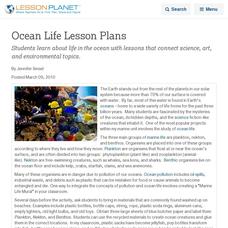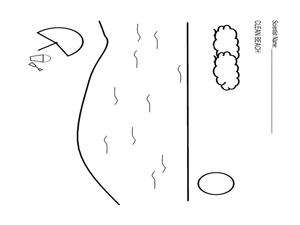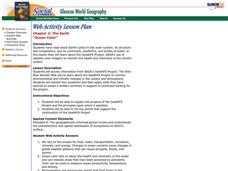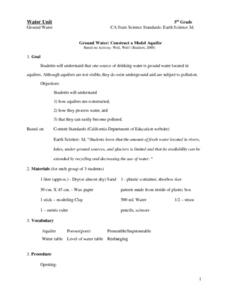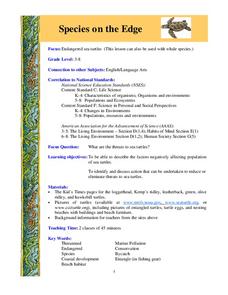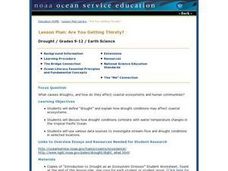Curated OER
Current Events and Fish
Fifth graders examine current events impacting aquatic life in their communities. They search for newspaper, magazine and television reports for information about aquatic life in local bodies of water. Students can write letters to...
Curated OER
Fallout!
Students plot the locations of fallout from two disasters that polluted much of the world's air. They plot the ash fallout from the 1980 Mt. St. Helen's eruption to see what the wind patterns in the United States look like overall. Next...
Curated OER
What is the Problem of Boston Harbor?
Students recognize the affects of technology on the environment. They examine data to determine methods to improve waater quality. A research paper is written to desribe recommendations for improving water in the future.
Curated OER
Lesson Six
Students investigate the importance of ocean resources and what humans need to do to maintain a healthy ocean. In this oceans lesson plan students participate in an activity after viewing a PowerPoint presentation on the Earth's Waters.
Curated OER
Species on the Edge
Young scholars study science. For this endangered species lesson, students examine sea turtles and actions that can be taken to help keep them alive. They work in small groups to research different species of turtles and share their...
NOAA
What's New?
Biodiversity in some areas is more diverse than one might think. Using a two-day lesson, pupils consider the biodiversity of the Hudson Canyon and the characteristics of one organism. They begin with an analysis of the common earthworm...
NOAA
Marine Policy
Save the oceans! The 22nd installment of a 23-part NOAA Enrichment in Marine sciences and Oceanography (NEMO) program focuses on laws and marine policy. Pupils take part in an activity investigating fisheries stock data.
Curated OER
The Chesapeake Bay in Captain John Smith's Time
When Captain John Smith visited the Chesapeake Bay in the summer of 1608, what types of animals and habitats did he encounter? Your young historians will analyze primary source documents to answer this question, as well as compare the...
Curated OER
A World in a Grain of Sand
Students go exploring Britain's beaches. For this geography lesson, students visit selected websites to learn about specific beach habitats and the history of cleaning those beaches.
Teach Engineering
The Great Pacific Garbage Patch
The Great Pacific Garbage Patch is one of several garbage patches around the world where garbage accumulates naturally. As part of a GIS unit that combines oceanography, environmental science, and life science, class members investigate...
Curated OER
Our Country's Environment
In these environment worksheets, students complete several multiple choice questions that teach them about the Earth's landforms and water.
Curated OER
Ocean Life Lesson Plans
Students learn about life in the ocean with lessons that connect science, art, and environmental topics.
Curated OER
Activity #8 Simulation of Oil Spills
Students conduct an experiment to simulate an oil spill and identify the characteristics of oil in water. They evaluate the effectiveness of various cleanup methods. They discuss the how to clean up an oil spill, and what causes oil...
Curated OER
Arctic cleanup
Ninth graders examine pollution problems and how it affects the community. In this arctic cleanup lesson plan students study ocean currents and how they affect pollution.
Curated OER
Fish Hazards
Students study the Pacific salmon and see the different challenges they face. In this environment lesson students complete several activities that show how humans have affected the salmon environment. These activities have varying...
Curated OER
Ocean Color
Young scholars examine NASA's SeaWiFS Project Web site to explore how the SeaWiFS Project monitors environmental and climatic changes in the oceans and atmosphere. They answer questions and write a summary in support of continued funding...
Curated OER
Out of the Deep
Students observe, describe, and record characteristics of ocean animals (mammals and fish) and sea shells. They conduct an experiment comparing and contrasting sugar water, salt water and fresh water and create a mural of coral reef...
Curated OER
Ground Water: Construct a Model Aquifer
Students recognize that one source of drinking water is ground water located in aquifers. They create a model of an aquifer and summarize their experience in a report.
Curated OER
Species on the Edge
Students examine sea turtles. In this endangered species lesson, students analyze sea turtle habitats. Students hypothesize why sea turtles could go extinct.
Curated OER
Are You Getting Thirsty?
Learners study droughts and how they affect communities and coastal ecosystems. In this ecosystems lesson students use data to examine drought conditions in certain areas.
Curated OER
Coral Bleaching
High schoolers examine the relationship between corals and zooxanthellae, identify stresses to corals, and explain coral bleaching. In this sea life lesson students predict the effects of increased temperatures on coral reefs.
Curated OER
Where's the Point?
Pupils examine runoff for the causes, the impact, and the solution. For this investigative lesson students construct a three dimensional model of a watershed and provide information of contaminated runoff to their audience.
Curated OER
Amphipods
Students identify organisms that live at the bottom of the body of water. In this biology lesson, students evaluate the effects of pollution to amphipods population. They examine collected data and create a bar graph comparing them.
Curated OER
Turning the Tide on Trash: Marine Debris Curriculum
Six different lessons comprise this unit on marine debris. Science, language arts, social studies, and art projects make this an ideal interdisciplinary unit. The result will be well-informed future citizens who can help make a...






